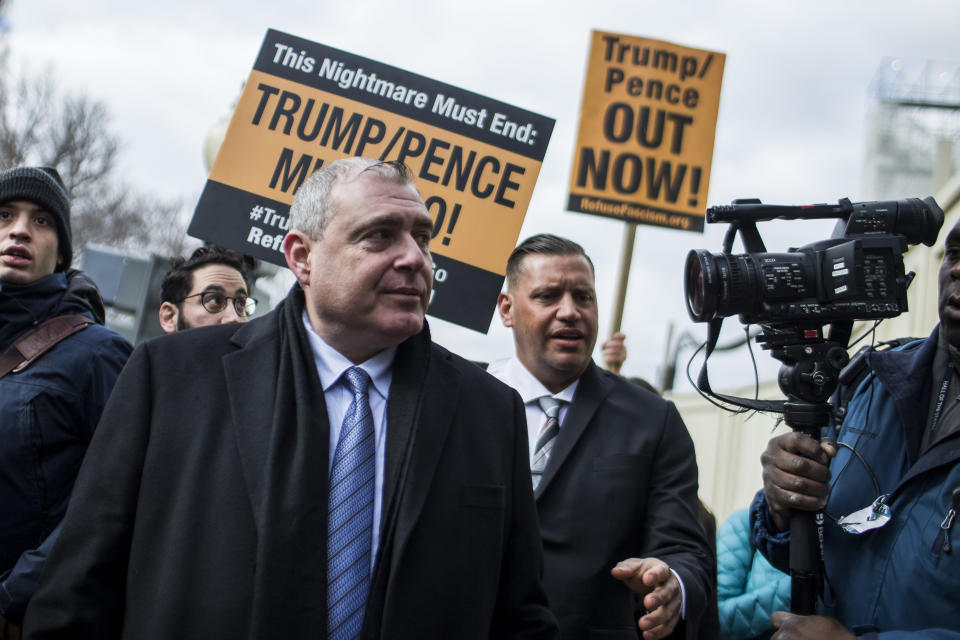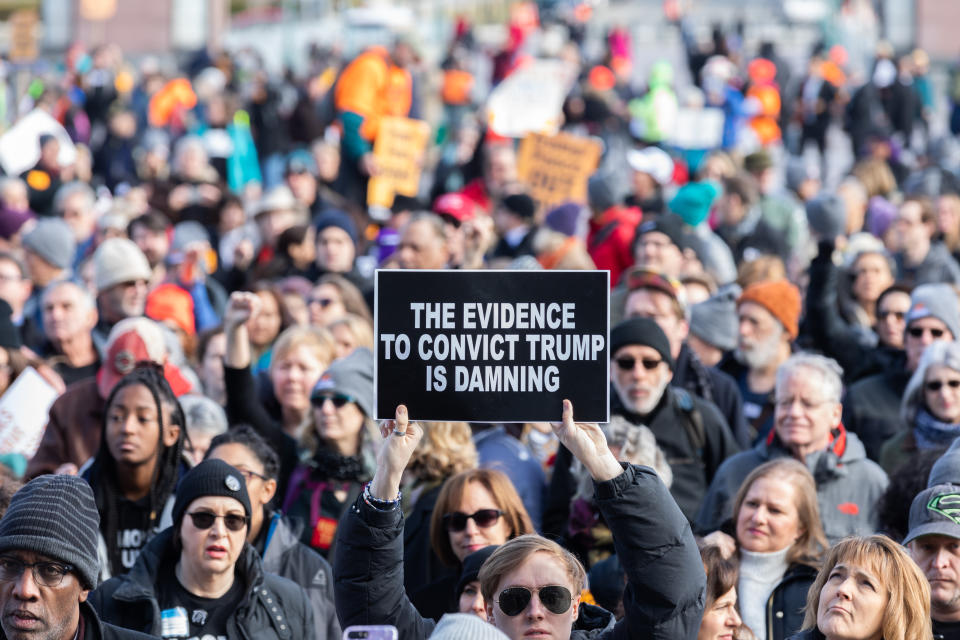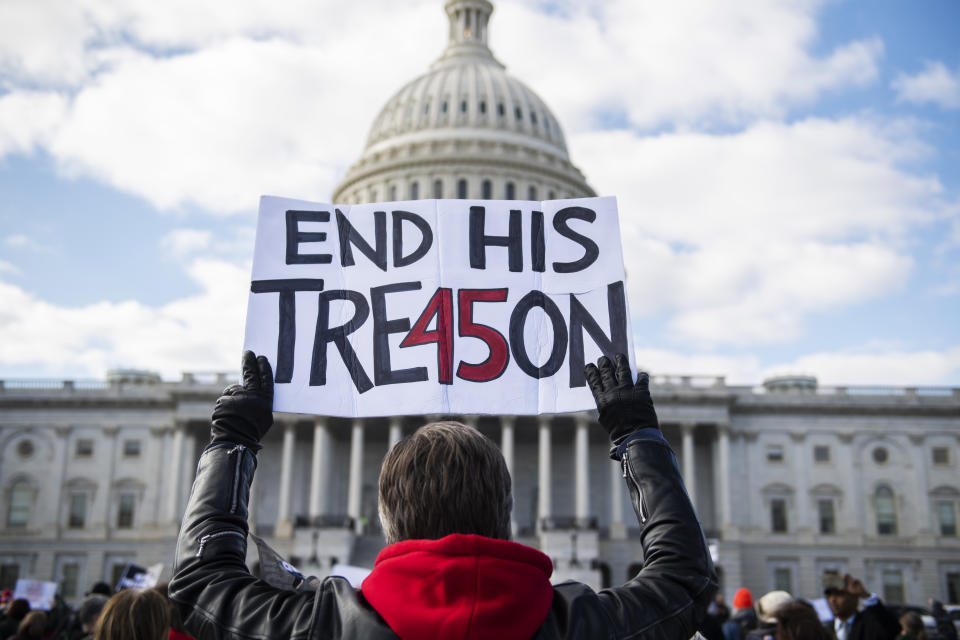Protests, Parnas and partisanship make for a uniquely chaotic day in Washington
WASHINGTON — Wednesday was the 1,114th day of the Trump presidency but also one of those that stand apart from all the other days because every moment is seemingly marked with a thermonuclear explosion of breaking news. The signing of a North American free trade agreement and a new proposal for a Middle East peace plan — both of which were announced Wednesday — would have been watershed events in any other administration.
In the Trump administration, they almost don’t rate as front-page news, not with the impeachment trial turning Washington into a political battlefield. Senators steeled themselves for another day of combat. Protesters crowded the streets. Journalists flashed their badges at U.S. Capitol Police, who shooed them into the bunker of power where Trump’s fate is being decided.
If this were reality television, it might have had very high ratings, a metric Trump is highly attuned to. And the ratings for impeachment have been a little, well, meh. Additional drama was required.
The day began, as days tend to begin in the Trump era, with a presidential tweet. Its target, predictably enough, was John Bolton, who in a forthcoming book reportedly writes that Trump explicitly tied military aid to Ukraine to the government in Kyiv’s announcing investigations that could help Trump’s 2020 electoral prospects.
With his 7:28 a.m. tweet, Trump blasted Bolton for his “mistakes of judgement,” adding that “if I listened to him, we would be in World War Six by now.” One was left to wonder, naturally enough, what had happened to World Wars Three through Five, but things do move quickly these days, especially in the space-time continuum of alternative facts.
Trump added that Bolton’s book was “nasty” and “untrue,” though, despite being allegedly fictitious, he said it also had to be classified as a matter of national security. This, like the missing world wars, was difficult to square, so one simply had to let it go, as the song from Disney’s “Frozen” famously counsels us to do.

But this was certain: In his house in the leafy suburb of Bethesda, Md., Bolton must have been smiling through his walrus mustache. His book is already a bestseller on Amazon, and publication is more than a month away, if it comes out on schedule.
And just as Trump was tweeting his morning away, Joseph Bondy was on an Acela train, speeding through the flatlands of New Jersey on his way to Washington. Bondy is the attorney for Lev Parnas, an associate of Rudy Giuliani, the former New York mayor who was allegedly enlisted by Trump to conduct the pressure campaign in Ukraine. Giuliani, in turn, reportedly enlisted Parnas, an immigrant from Ukraine who acted as a kind of go-between from the government in Washington to the government in Kyiv.
Last fall, Parnas and another Giuliani associate, Igor Fruman, were arrested at Dulles International Airport outside Washington, D.C., for campaign-finance violations. Parnas then promptly hired Bondy, whose specialty is cannabis. And with the help of his new attorney, Parnas developed something resembling a conscience, or at least the appearance of one.
Parnas has proved as irritating to Trump as conservative bête noire Adam Schiff, D-Calif., an impeachment manager for the Senate trial. There was Parnas’s interview with Rachel Maddow, which was bad enough for its suggestion that Trump “knew exactly what was going on” in Kyiv. Then there was the secret recording, shared by Bondy with congressional investigators, that plainly shows Trump ordering the dismissal of his ambassador to Ukraine, Marie Yovanovitch.
And now there was Parnas, in Washington, right in Trump’s backyard. A scrum of reporters followed him and Bondy through the city as if they were some species slightly more thrilling — and rarefied — than two middle-aged guys in charcoal suits.
The weather was good, and Parnas was in a talkative mood. “Trump world is like a cult, and a lot of these senators are in the cult,” he told reporters. Parnas was there, presumably, to break the spell. “I’d love to do it under oath,” he added.

Parnas and Bondy made their way to the office of Senate Minority Leader Chuck Schumer, who had provided Parnas with tickets to watch the impeachment trial in the Senate gallery.
This would have been, perhaps, a scene akin to that of Bill Clinton’s accusers watching the second presidential debate between Hillary Clinton and Trump in 2016. Alas, it is a scene that will have to live on in the imagination. The charges against Parnas are serious enough that federal authorities have required him to wear an ankle monitor, presumably because he is a flight risk. Such monitors, it turned out, are not allowed in the Senate chamber.
Parnas, who always looks a little melancholy, appeared especially so as he discovered that he would not be able to look down at Trump’s attorneys, to glower at the Republican senators who have dismissed him as yet another inconsequential presidential hanger-on.
Meanwhile, at the White House, the president had signed his new trade agreement with Canada and Mexico, called the USMCA. And his son-in-law, Jared Kushner, was busy selling the administration’s new plan for a Palestinian state. The Palestinians had not been consulted on the matter of their statehood and were, somewhat understandably, a little upset. But it was the most serious such plan in years, serious enough for the usually reticent Kushner to do a number of media appearances.
And it was only noon.
Protesters, meanwhile, gathered both outside the U.S. Capitol and in the Hart Senate Office Building. The protests were not nearly as large as those accompanying the confirmation fight over Brett Kavanaugh. Still, they suggest that people do care about impeachment and that, for all the complexities of Senate procedure, Americans are not quite as apathetic as cable news pundits make them out to be.
The protesters filled Hart’s vast marble atrium, just as they had during the days of the Kavanaugh confirmation battle. Some wore T-shirts that said “Trump Is Guilty.” All wanted Bolton and other key figures in the alleged Ukraine pressure campaign to testify. Whether they do so is up to the senators, many of whom have offices looking down into that very same Hart floor. They will vote on the witness question most likely on Friday.

Later, the protesters made their way outside, where they appeared to mix with another strain of activist, this second one apparently affiliated with a socialist faction. But if there were differences, and there surely were, these were put aside for the sake of loudly denouncing Trump.
And denouncing him creatively too. One protester was dressed up as Vladimir Putin, the Russian president, with Trump as a puppet on a string. Another was dressed as Trump himself: dark suit, pink tie, yellow hair, orange face. This faux Trump held a sign: “Respect the divine right of presidents,” it said.
Another sign depicted Trump as Benito Mussolini, the World War II-era fascist dictator of Italy.
Other placards were more to the point:
“Trump is not above the law.”
“We hear the liars lying.”
“Trials have witnesses.”
The protesters congregated on a plaza outside the Capitol, where a row of police looked on. The black SUVs that ferry senators through the city idled like a slightly ominous herd of game. Lobbyists and legislative staffers scurried with their briefcases, some stopping to take pictures. Here was yet another thing to tell the grandkids about.
The only calm place in Washington on Wednesday was the eye of the storm, the Senate chamber where Trump’s trial entered its eighth day. There are no phones allowed in the chamber, for senators, members of the press or anyone else. That turned the august chamber into a kind of meditation retreat, only with more marble than your average yoga studio and more lawyerly allusions to Alexander Hamilton and his “Federalist Papers.” Many, many more references to “The Federalist Papers.”
The day was reserved for questions from the senators to both the impeachment managers and Trump’s lawyers. Young aides scurried across the Senate floor, taking the written questions from senators and delivering them — always down the center aisle — to Chief Justice John Roberts.
The matter at hand was acrimonious, to be sure, but the orderly proceedings only compounded the strangely calming effect. Here, in the heart of political Washington, was the refuge Americans have been seeking from politics.
As deputy White House counsel Patrick Philbin offered a defense of Trump, Sen. Lindsey Graham, R-S.C., let out a sizable yawn he did not bother to conceal. He then adjusted his tie, ran his fingers along his teeth and brushed something off the shoulder of his suit coat before settling down to hear the arguments he had already heard many times before.
Unlike so many others on this harrowing day, the senator looked positively relaxed.
_____
Read more from Yahoo News:




